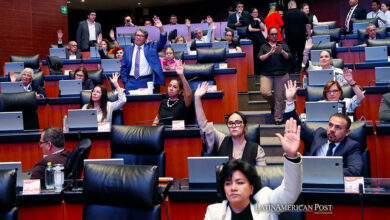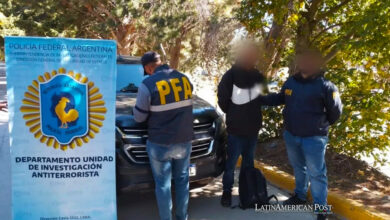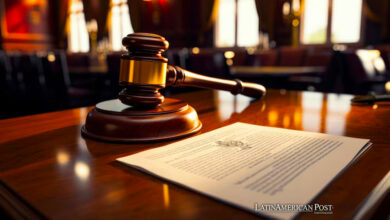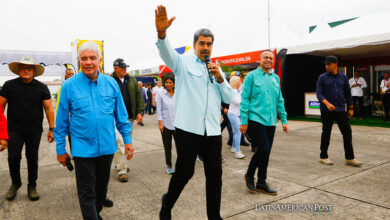Serbian tennis player Novak Djokovic showed his political side, whether on nationalist or public health issues.

Photo: Flickr-Christian Mesiano
LatinAmerican Post | Santiago Gómez Hernández
Listen to this article
Leer en español: El lado político de Novak Djokovic
Novak Djokovic is not only one of the greatest tennis players in history, after overtaking the Spanish Rafael Nadal (22) in Grand Slam titles and surpassing the Swiss Roger Federer by 2. Lately, the Serbian has shown his more political side and is emerging as one of the most influential people in his country and the sports world. Whether for his anti-vaccine stances or his nationalist comments, Djokovic went from the covers of sports to show his more political side.
Novak Djokovic has always broken the mold. Since the beginning of his career, he has managed to conquer many fans for his personality and his well-known imitations of other players on the circuit. In addition, he was also controversial off the court. He does not consume gluten and follows a vegan diet, which has led him to receive accusations of not eating like an elite athlete (despite being one of the greatest in the history of men's tennis).
He is also considered a holistic person who likes natural medicine, homeopathy, meditation, and yoga. He believes a lot in positive energies and thoughts. He is known to practice intermittent fasting like other athletes.
Novak Djokovic and his Anti-Vaccine Stance
The Serbian tennis player Novak Djokovic gained worldwide relevance after refusing to be vaccinated during the COVID-19 pandemic. Although he never called himself anti-vaccine and even claimed that he was not, he was always open about the fact that if he had to be vaccinated to play different tournaments, he preferred not to participate.
This cost him his participation in several Grand Slams and significant events. In 2022, he could not participate in the Australian Open due to a veto ordered by the Australian government to anyone without proper vaccinations. The Serb even tried to enter the Oceanic country but was detained in the migrant detention center and was confined to his hotel room until he was denied entry.
The same year, he had to cancel his participation in the US Open for the same reasons (policies restricting entry to the country for unvaccinated people). This showed that he would defend his position above his professional career.
This caused an international uproar, ending in a diplomatic crisis between Serbia and Australia. The European government complained that its national hero had been mistreated from Canberra.
You can also read: Unlike Uganda, these are safe LGBT countries in Africa and Latam
Djokovic is originally from Belgrade and became one of the most relevant figures in the anti-vaccine context. For this reason, he was defended as a symbol of the movement. Even though the Serbian always made it clear that it was a personal decision, he tried to dissociate himself from the anti-vaccine political phenomenon. But it was irremediable that many protesters did not show appreciation to the tennis player. Australian politician Craig Kelly, leader of the Australian Freedom Party, said the athlete was a political prisoner of the Australian government.
Djokovic on Domestic Politics
But Novak Djokovic's impact was not only on COVID-19 issues. Recently, the Serb wrote, "Kosovo is the heart of Serbia. Stop the violence." Lately, the tension in the country (not recognized by Serbia) of Kosovo has been on the rise. Last week there was a clash between the Albanian population and Serbs living in the territory, so a conflict is about to start.
This even led to riots and attacks on NATO troops in the country after the Balkan War.
Although Djokovic's message advocates peace, the first part of his appeal can be associated with Serbian nationalist discourses, which defend the position that Kosovo is part of Serbia and not an independent territory.
This is because, despite its declaration of independence from Serbia in 2008 and its majority Albanian population, Kosovo has a fundamental relationship with the Serbs. Since 1389, the Battle of Kosovo has been considered the starting point of the Serbian nation, and there are also prominent landmarks of the Serbian Orthodox Church. In addition, there is still a Serbian minority population in the territory, which views the Albanian (Muslim) leaders with suspicion.





